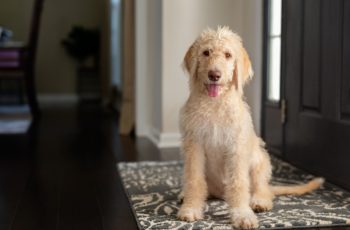Boxers, from puppies to well into adulthood, are high energy dogs who, when in good shape, are a muscular breed with a rather athletic build (the boxer stance is one that’s iconic after all.) This all means that the food they eat has to support all that energy, the development and maintenance of those muscles while also helping to prevent excessive weight gain, which is something that older Boxer dogs can be prone to, and is very bad for their health.
But with this in mind, what do boxers eat? Or, more specifically, what should they eat?
The simple answer to that question is a high quality diet fed in smaller, more frequent meals to help prevent another problem many boxers have: eating too fast, which can lead to stomach upset, excessive flatulence and even a life-threatening condition called bloat.
However, with the many choices available when it comes to dog foods these days, determining just what a ‘high quality’ diet is can seem quite hard. Here we are going to take a closer look at what boxer dogs can and cannot, and should and should not, eat, as well as some reasons the right diet is so essential to your boxer dog’s health and happiness
Boxer Dog Specific Feeding Concerns
Boxers are a generally healthy breed, although they do have a few health issues. As a result, when choosing food for your boxer, bear these health considerations in mind.
The following are some of the most common health issues that boxers face:
Allergies to Foods
Food allergies can affect any dog, but boxers are more likely than other breeds to develop them. To lessen the likelihood of this happening, limit the ingredients you feed your dog and only choose high-quality foods that are free of artificial tastes and colors.
Heart Disease
Aortic/subaortic stenosis, cardiomyopathy, and dilated cardiomyopathy are just a few of the cardiac diseases that boxers commonly face more often than some other breeds. While these are mostly inherited variables beyond your control, it’s a good idea to look for foods that include the amino acid L-carnitine to help their heart stay as healthy as possible.
Bloat
Boxers are one of the breeds most likely to suffer from bloat. Encourage your boxer to eat his meal slowly, and opt for a kibble that encourages them to chew their food rather than swallow it.
After meals, keep your boxer calm for at least a half hour.
Joint Concerns
Boxers frequently develop joint problems as a result of their genetic composition as well as their proclivity for rough and active play. In light of these facts, it may be beneficial to look for foods that include chondroitin and glucosamine, which can sometimes aid joint health.
7 Foods Boxer Dogs Can and Cannot Eat
Before we get into just what foodstuffs are best for your boxer, we should take a look at which foods they can eat (especially if they are good for them) and which should be avoided:
Foods Boxers Can (and Should) Eat
High Quality Kibble
Most boxers get much of their nutrition from a high quality kibble fed to them on a daily basis. But what is that? It can be hard to tell with so many on the market. In a nutshell though, a good quality kibble for boxers is one that is made using limited ingredients, has a protein as the first ingredient – energetic boxers really need their protein – and is free of artificial colors and other additives.
High Quality Wet Food
If you were to give them a choice, most Boxers would prefer wet food, as boxers have a superb sense of smell and that wet food aroma is simply more appealing. Wet food can also be a great way to give them the protein they need, with lean proteins like chicken, salmon, whitefish, duck and venison all being excellent ingredient choices to be on the lookout for.
Peanut Butter
Peanut butter is a great source of tasty, natural protein for your pup and also of vitamins B and E as well as some essential amino acids. You should only offer it occasionally though, choose the smooth style rather than the chunky and never feed your boxer ‘lite’ peanut butters that contain the artificial sweetener Xylitol, as while that’s safe for people, it’s a substance that is toxic for dogs.
Yogurt and Pineapple
Often boxers have something of a tendency, to put it bluntly, fart a lot. A higher quality diet can go a long way to solving the problem, but the occasional pineapple chunk or spoonful of plain, full fat yogurt can be excellent ‘fart busters’ as well.
Foods Boxers Cannot (and Should Not) Eat
Dairy Other Than Yogurt
You’d be excused for assuming that dairy is a great option for your boxer ; after all, a pint of milk has long been touted as beneficial for the bones, and cheese has long been touted as a terrific source of protein.
But that all applies to humans. For boxers (and many other dog breeds) dairy is a phlegm and mucus producer which disrupts digestion, causing bloating and gas in most boxers. In addition, dairy sugars are inflammatory as well as mucus-producing as well. As short nosed pups, boxers can have a harder time catching their breath than their longer snorted peers when active, and as they rarely slow down helping them breathe better is a must.
Too Much Broccoli
Broccoli is an easy to cook, easy to feed vegetable that some dogs enjoy, and it contains plenty of vitamins and minerals, which is a good thing. It is also a very fibrous veggie though, and can quickly lead to excess gas and stomach upset in boxers. With this in mind, only feed them broccoli occasionally if they really like it, but focus on giving them all the nutrition they need via their everyday dog food.
Anything with Artificial Sweeteners
This one applies to all pups, not just boxer dogs. Because they have heard that older boxers are prone to weight gain, some pet parents might consider offering their pups ‘lite’ versions of things like yogurt and peanut butter to shave off some calories. This is a very bad idea, however, as most ‘lite’ foods like these contain artificial sweeteners which are, at varying levels, toxic to dogs.
How Can I Tell if My Boxer Dog Has Food Allergies?
As we mentioned earlier, many boxers are prone to food allergies. But how can you tell?
Some common signs of food allergies in boxers include:
Just what foods your boxer might be allergic to can be hard to determine. Formal allergy testing for dogs is not as precise as it is for humans, so often figuring out what foods are causing an allergic reaction is a process of elimination to be conducted at home.
This is something that should be discussed with your vet, as they can help you set up a ‘testing’ process that still ensures that your boxer gets all the nutrition he needs as you figure out which ones don’t agree with him.
Switching foods constantly can be bad for your dog’s health in general, especially their digestive health, so you’ll need to go slowly. Try feeding single ingredient foods that are still high in protein – but consider leaving out chicken, as that’s a common allergy trigger in boxers – and contain all the vitamins and minerals he needs.
Boxer Dog Ideal Weight
Speaking of nutrition, just how much should your boxer weigh? Given that they are lean looking, but rather muscular, dogs when in good health, and often fairly tall, this is something else that can be hard to figure out.
According to the American Kennel Club, who set the breed standard for this oft shown breed, 65 to 80 pounds for an adult male, and 50 to 70 pounds for a female. Your vet can help you determine your pup’s ideal weight, too, based on his physical exams and his activity levels.
Boxer Dry Skin and Hair Loss Causes
Sometimes food allergies can be the culprit when a boxer dog displays dry, itchy skin and patchy hair loss, which can be quite common. But if it’s not his food, what else could be to blame?
A boxer, which is a very short haired pup, may sometimes have more sensitive skin than others, and so a rough blanket, a plastic collar, and contact outdoors with certain plants while they romp around may also be to blame.
Try sticking to leather collars, cotton or wool bedding and avoiding areas where there are lots of weeds on your walks to help prevent boxer skin issues, and of course, discuss them with your vet at your boxer dog’s next visit.
Most Recommended for Boxer Dogs
Best Dog Food for Boxers With Skin Allergies
One of the best choices you can make for your Boxer is to choose one of the four Ollie fresh dog food offerings ( beef, chicken, turkey and lamb). It is a very nutritious option for a boxer dog with food allergies. (Get 50% OFF your first order here).
Most-Challenging Fun Feeder Dog Bowl
One of the best things you can do to prevent flatulence and bloat is to help your boxer learn to eat slower making use of a puzzle bowl. We love the Outward Hound’s Interactive Fun Feeder Dog Bowl.
Best Online Training Tool For Boxers
Boxers are high energy dogs, especially when they are young, and as a result they need a lot of physical and mental exercise to use up that energy before it becomes destructive behavior. But how do you train a boxer dog? Doggy Dan’s The Online Dog Trainer offers most effective and quickest way to change your dog’s behavior.


